RISE Program Ignites City Competition for International Students
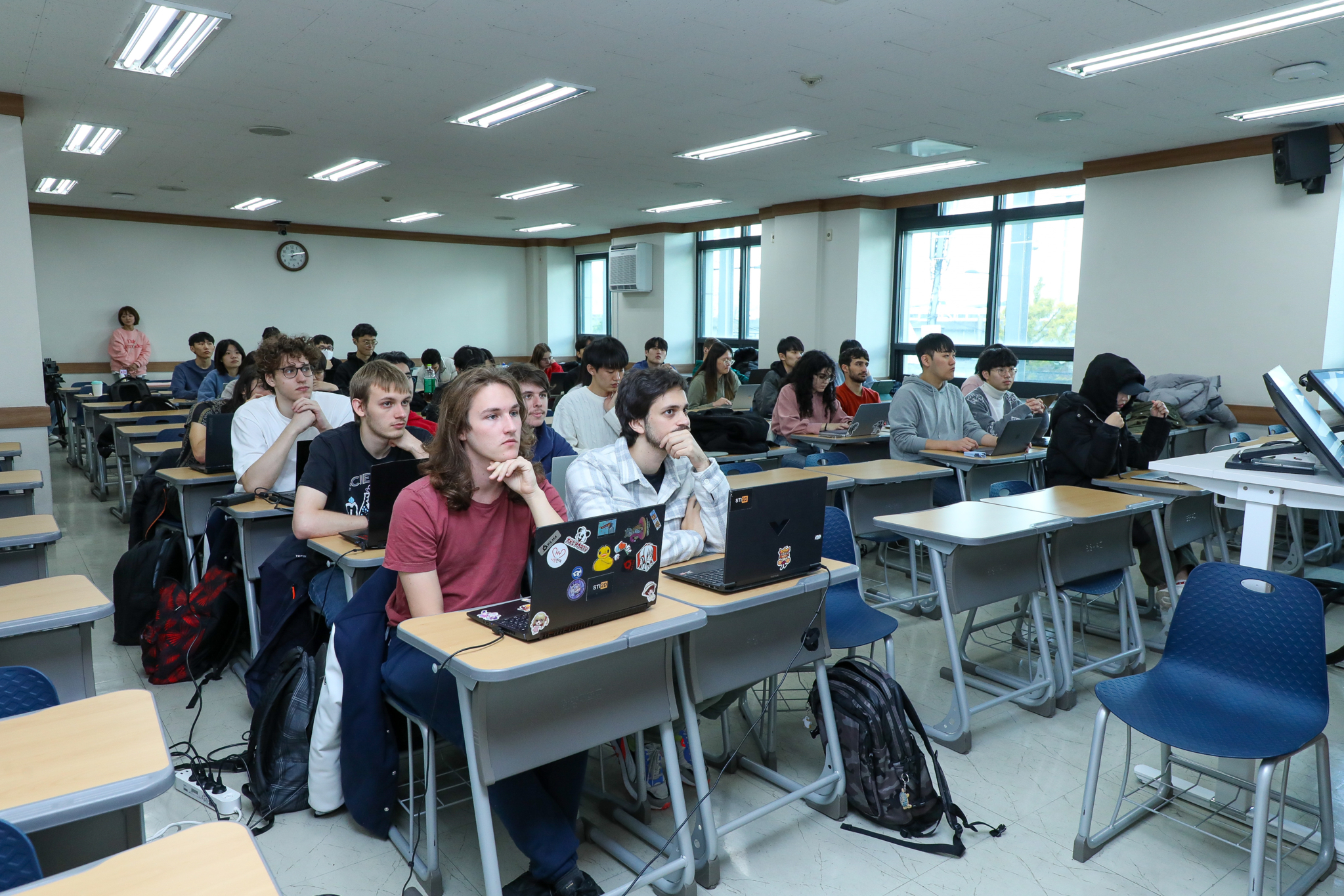
International students take classes at Hanyang University, one of the universities chosen to carry out Seoul's Regional Innovation System & Education (RISE) initiative to invite more international students. [HANYANG UNIVERSITY]
Since the Regional Innovation System & Education (RISE) initiative expanded nationwide this year, various regional governments have been naming their university partners, with international student support among the common goals.
Under the RISE program, local governments can allocate a portion of the Ministry of Education’s annual higher education budget for projects to innovate their region. Governments need to work with local universities, with many announcing which institutions they will partner with and fund.
While each government has different plans, many of them center around developing industries they specialize in, creating lifelong education programs, or fostering young startups.
Another common goal is to invite more international students and encourage them to stay after graduation.
Plans are in their early stages, but some regions and universities have laid out detailed strategies that would benefit current international students and those considering coming to study in Korea.
Seoul
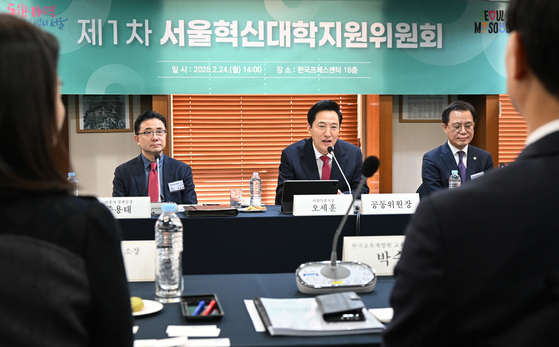
Seoul Mayor Oh Se-hoon talks during a meeting on Feb. 24 to introduce the city's Regional Innovation System & Education (RISE) plans to universities interested in participating. [SEOUL METROPOLITAN GOVERNMENT]
On June 11, Seoul finalized the list of 35 universities it will work with for the RISE project, allocating a government budget of 56.5 billion won ($41.6 million) to the universities this year. The city is also contributing an additional 20 billion won.
The city has five goals it wants to achieve, with enhancing universities' global competitiveness — including international student-focused plans — among them.
Through RISE, Seoul hopes to attract more international students, particularly in high-tech industries such as AI, bio, fintech, robotics and quantum science.
To do so, the city selected four universities — Korea University, Sogang University, Seoul National University and Hanyang University — as well as a consortium between Yonsei University and Seoul National University of Science and Technology. These institutions will receive a total of 5 billion won in funding to carry out their plans.
Each selected university is tasked with hosting around 40 tech students in master’s degree programs or higher, with certain benefits offered to attract them.
They will also be offered visa issuance and consultation support through city-run organizations such as the Seoul Global Center. The Seoul Job Center and Startup Plus will provide information about open positions and help match students with relevant jobs.
Each university has a specific area of focus. Korea University, for example, was selected for its plans to promote its new College of Informatics while partnering with AI companies to create career programs. Sogang University will focus on ICT, AI and bio programs while also creating Korean language and entrepreneurship training classes. Yonsei University plans to emphasize its bio and AI programs.
Incheon
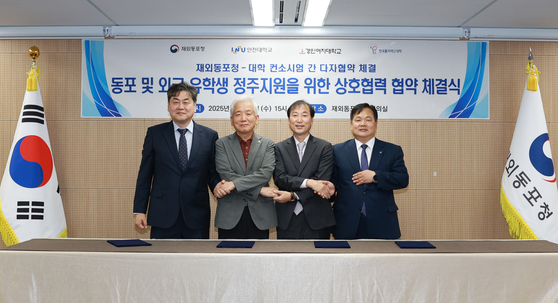
Officials from the Overseas Koreans Agency, Kyung-in Women's University, Incheon National University and Korea Polytechnic Ⅱ Incheon Campus pose for a photo to celebrate signing a memorandum of understanding to offer support for international students on May 28. [OVERSEAS KOREANS AGENCY]
Inviting more international students is also one of the goals of Incheon’s RISE project, which includes overseas Koreans as well.
In May, Incheon announced it will work with 12 universities for this year’s RISE project, allocating 21.4 billion won in funding.
In its mission to solve local challenges, Incheon hopes to attract and better support international students by working with the Overseas Koreans Agency.
Three universities — Kyung-in Women’s University, Incheon National University and Korea Polytechnic Ⅱ Incheon Campus — were selected to carry out these initiatives and will receive a total of 6 billion won this year.
These schools will work with the Overseas Koreans Agency to develop Korean language and cultural experience programs for overseas Koreans and international students. Startup and career training will also be provided, along with practical information to help newcomers adjust to life in Korea.
Busan
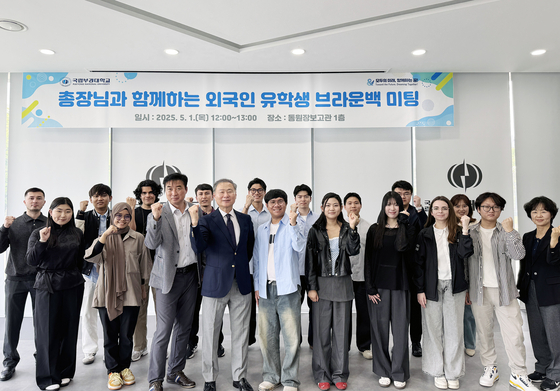
Pukyong National University President Bae Sang-hoon meets the university's international students on May 1, listening to student opinions and introducing plans to open a new college for international students. [PUKYONG NATIONAL UNIVERSITY]
Busan chose 20 universities to receive 134.1 billion won in RISE funding this year, including an additional 40.1 billion won from the city.
Dongseo University is among the selected institutions and plans to increase its international student enrollment.
To achieve this, it will strengthen education in fields such as digital transformation and startup training.
The university has already launched the Startup Club program, which will run from June to December.
International students who are part of a club at Dongseo University and interested in launching a startup can apply for the program in groups. Each group may receive up to 1 million won in support to start a business. Coworking space and mentoring are provided, and outstanding teams will have opportunities to participate in overseas startup competitions or pitching events.
Dong-eui Institute of Technology will offer degree programs for international students in areas such as mobility, materials and parts and K-beauty. Students will be offered business Korean classes, career training and support in transitioning to E-7 work visas.
Pukyong National University will also launch international student-related initiatives, including the creation of a dedicated college for international students and expanded global research opportunities.
North Gyeongsang
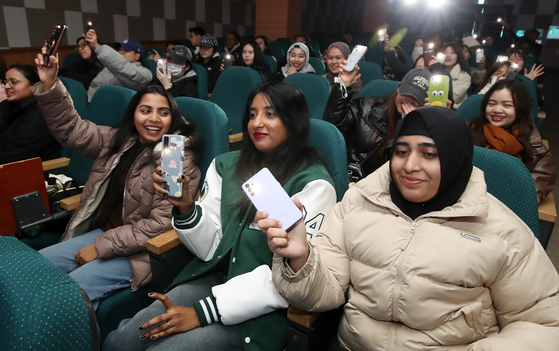
Daegu University students attend the International Students' Day event on Dec. 19, 2024. [NEWS1]
North Gyeongsang was among the first to select RISE partner universities, choosing 29 institutions in April and allocating 113.5 billion won in funding for the year.
The province outlined four main development areas through RISE, with the K-Learning goal specifically covering international students.
A total of 11 universities — Gyeongbuk National University, Daegu University, Daeshin University, Catholic Sangji College, Kyongbuk Science College, Gyeongbuk College of Health, Daekyeung University, Munkyung College, Sunlin University, Andong Science College and Hosan University — will work to attract more international students and will receive a combined 3 billion won.
Daegu University plans to open a college for international students in the 2026 academic year. The college will offer majors taught entirely in English as well as bilingual programs, alongside electives in Korean language and culture.
Daeshin University is developing career training programs and signed a memorandum of understanding in May with education company Raon Meta to create a metaverse training program for international students interested in caregiving.
Known as the Bridge Program, the initiative will allow students to take certain caregiving courses in the metaverse. International students will also have access to Korean language instruction as part of the program.
Sunlin University, located in Pohang, will lead the creation of an educational hub focused on supporting international students in the region.
BY LEE TAE-HEE [lee.taehee2@joongang.co.kr]
Post a Comment for "RISE Program Ignites City Competition for International Students"
Post a Comment